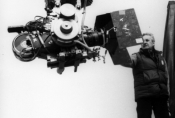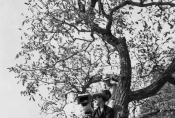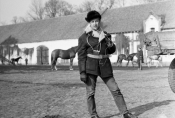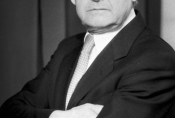Andrzej Wajda

One of the best-known and most honoured Polish film directors, co-founder of the Polish Film School; also a prominent theatre director, writer and set designer. He was born in Suwałki in 1926. He spent the war in Radom, where he attended clandestine classes and briefly studied at a private school of painting, while working on the railroads. After the war, he studied painting at the Academy of Fine Arts in Krakow and directing at the State Film School in Łódź. Kanał/Canal (1957) was his second feature film after Pokolenie/Generation (1954). After that, he made Popiół i diament/Ashes and Diamonds (1958), which cemented his leading position in Polish and European cinema. In 1959, Wajda made his first colour film – Lotna, and in subsequent years, films such as Niewinni czarodzieje/Innocent Sorcerers (about the young people of the jazz generation, rebellious and lonely at the same time), Samson (the story of a Jew who escaped from the ghetto) and two foreign films: the Yugoslav Sibirska Ledi Magbet/Siberian Lady Macbeth and the Franco-German co-production Miłość dwudziestolatków/Love at Twenty (1962).
Out of nearly forty films directed by Wajda, the most famous are his adaptations of Polish literary classics – including Stefan Zeromski’s Popioły/The Ashes (1965), Wyspiański’s Wesele/The Wedding (1973), Ziemia obiecana/The Promised Land by Reymont (nominated for an Academy Award, 1974), Joseph Conrad's Smuga cienia/The Shadow Line (1976), Panny z Wilka/The Maids of Wilko by Iwaszkiewicz and Pan Tadeusz by Adam Mickiewicz (1999). He also gained great popularity with his political settlement films – Człowiek z marmuru/Man of Marble (1978) and Człowiek z żelaza/Man of Iron (awarded the Palme d'Or at the Cannes Film Festival, 1981), Danton (1982) and Korczak (1990). For Katyn (2007), he was nominated for an Oscar.
Andrzej Wajda’s oeuvre represents a diverse auteur cinema. He draws from painting, Polish literature and Polish national tradition. In some of Wajda's films, the ideas were subject to numerous interventions by the censor during the Polish People's republic; they provoked heated discussions and disputes. In 2000, Andrzej Wajda was awarded an honorary Oscar, and in 2006 – the Berlin Golden Bear for Lifetime Achievement.
In 1979-1983, Wajda was the chairman of the Polish Filmmakers Association (he is honorary chairman now). He is also a member of the American and European Film Academy. In 1989-1991, he was a senator. He is the initiator and sponsor (using the Kyoto Award he received the 1987) of the Centre of Japanese Art and Technology "Manggha" in Krakow, and founder of Andrzej Wajda’s Master School of Film Directing, operating since 2002 in Warsaw.
Seweryn Kuśmierczyk, Stanisław Zawiśliński
Selected filmography
-
1956
THE CANAL
-
1958
ASHES AND DIAMONDS
-
1960
INNOCENT SORCERERS
-
1970
THE BIRCH WOOD
-
1972
THE WEDDING
-
1974
THE PROMISED LAND
-
1976
MAN OF MARBLE
-
1979
THE MAIDS OF WILKO
-
1981
MAN OF IRON
-
1985
CHRONICLE OF AMOROUS ACCIDENTS
Articles
-
The Splendour of Male Relationship
Sebastian Jagielski
„Kwartalnik Filmowy” – Special Issue 2013: “Polish Film Scholars on Polish Cinema”
-
Bodiless Enemy
Rafał Marszałek
„Kwartalnik Filmowy” – Special Issue 2013: “Polish Film Scholars on Polish Cinema”
-
That Which is Absent
Karolina Kosińska
„Kwartalnik Filmowy” – Special Issue 2013: “Polish Film Scholars on Polish Cinema”




















